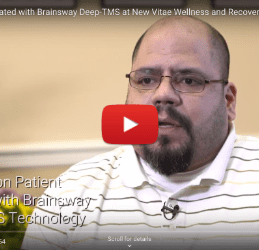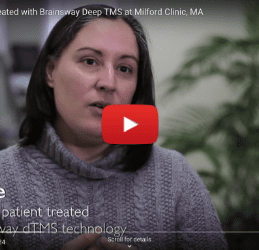All your TMS questions
Transcranial magnetic stimulation, or TMS, is a non-invasive form of brain stimulation. TMS devices operate completely outside of the body and affect central nervous system activity by applying powerful magnetic fields to specific areas of the brain that we know are involved in depression. TMS doesn’t require anesthesia and it is generally exceptionally well tolerated as compared to the side effects often seen with medications and ECT.
TMS is a safe, proven and effective therapy course with non of the side effects of antidepressant medications. Most individuals do not experience any significant side effects. A small percentage of people have mild discomfort on or near the area of stimulation during the session. For most, this discomfort improves over the first few treatments. Some patients experience mild headaches after the session, but this is even less common. There is a small risk of seizure induction by the treatment which is rare- estimated to be about 1 in 10,000 cases. Since 2013, Health Canada has deemed TMS as safe and effective.
Recent published studies have shown very encouraging results. In one study 80% of people who have failed to receive benefit from medications experience significant improvement with TMS. About half of these individuals experience a full remission, meaning that their symptoms go away completely. Results may vary from person to person.
Simply put – most TMS patients enjoy significant relief in response to treatment. Some patients experience total remission. Like any treatment, TMS doesn’t help every patient. Contact us to explore if TMS can work for you.
Some patients feel better in the first or second week of treatment. Most people notice improvement in 3-4 weeks. Others will take up to 5-6 weeks to enjoy significant response. Like any treatment, TMS doesn’t help every patient.
Most TMS patients who experience relief, feel better for a little more than a year. There will be quite a few clients who will remain well for years after treatment stops. Your chances of remaining well may be higher if you receive maintenance TMS. Results may vary from person to person.
For many people with depression, ECT can be too difficult to tolerate due to side effects on memory and cognition. For those individuals and the many others who have had an inadequate response to medications and therapy alone, TMS is the newest treatment option.
Yes! TMS therapy has been approved by Health Canada for patients suffering from Major Depressive Disorder. The Canadian Network for Mood and Anxiety Treatments (CANMAT, 2016) considers TMS therapy to be a first-line treatment for individuals with treatment-resistant depression who have failed at least one antidepressant.
Some extended health care benefit plans will provide partial or full fees for the services of a registered psychologist. Please contact your health care benefit provider to find further information about your coverage. If your insurance provides coverage, a receipt will be provided that you may submit, or to claim as medical expenses on your income tax return, if that applies.
The fees are consistent with the guidelines set out by the Ontario Psychological Association (OPA). We offer a number of payment plans, making TMS affordable for everyone. Payment is accepted by credit card or cash. We also have financing options.
Initially, there is no change in medications. As treatment progresses, we recommend that you consult with your prescribing doctor to determine whether it would be appropriate to safely wean you off of any medication.
TMS is a non-invasive very safe and highly effective alternative to ECT and medication.
TMS is particularly suited for:
- People who have not had good results with other standard treatments;
- People who have had problems with side effects from other standard treatments;
- People who have a preference to avoid medications or more invasive treatments.
You deserve to find joy again. Please take our short online Self Assessment test and book a free, no obligation consultation today. It’s time to take your life back.
There is no moment more vital than the present one.
There is no space more critical than the one in which you stand.


